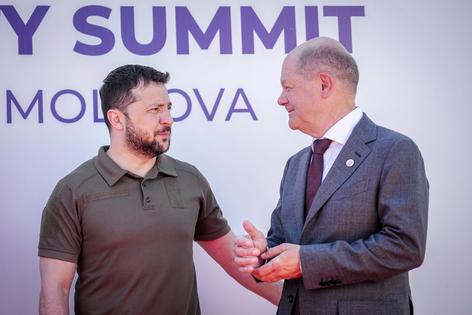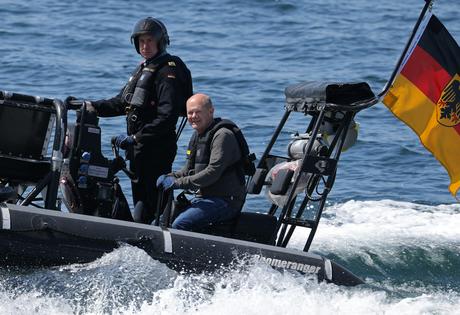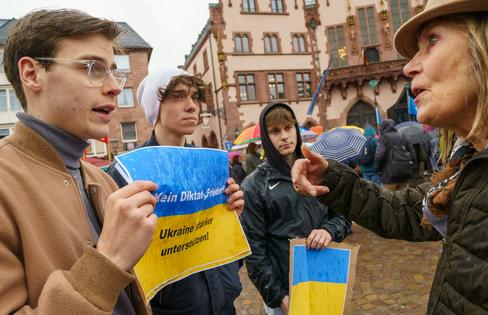Germany’s turning point: 2 years into strategic pivot, progress made bodes well for the US, NATO and the world
Published in Political News
It has now been more than two years since German Chancellor Olaf Scholz entered a new compound word into the jargon of global politics: “Zeitenwende.”
Scholz’s Zeitenwende speech of Feb. 27, 2022 – the word loosely translates as “turning point” – came as the world was coming to grips with Russia’s full-scale invasion of Ukraine. It marked a major shift for the world’s third-largest economy and its foreign and defense policy, including significant investments in Germany’s depleted armed forces.
With NATO’s 75th anniversary summit approaching in July, has the Scholz government lived up to its promises? And what are the implications of Germany’s pivot for the United States?
As an expert on international security, I am well aware that critics on both sides of the Atlantic argue the Scholz government has failed to adequately strengthen Germany’s armed forces and that its military support for Ukraine is insufficient. Yet when measuring Scholz’s actions against the objectives he originally articulated, there is reason to believe that he has mostly delivered on his promises.
Beyond immediate support for Ukraine, Scholz formulated two major long-term goals in his speech. First, strengthen the German military with a large, one-time investment, followed by a permanent increase in defense spending. Second, adopt a more assertive foreign policy in defense of a rules-based international order. To this end, Scholz sought to align Germany even more closely with its transatlantic allies, while reducing the country’s energy and economic dependence on Russia and China.
Taken together, the Zeitenwende amounted to a shift from a strategy of engagement with Russia and China to one of deterrence and derisking – that is, efforts to diversify supply chains to make Germany less vulnerable to economic coercion.
Scholz’s government has created a 100 billion-euro (about US$108 billion) special fund for the Bundeswehr – Germany’s armed forces – and for the first time since the collapse of the Soviet Union in 1991, Germany will spend 2% of its GDP on its military in 2024. Scholz has further promised to keep that level of funding into the 2030s.
These spending levels are unlikely to turn Germany’s military into the “powerful, cutting-edge” force Scholz envisioned. The Bundeswehr has “too little of everything,” as the German Parliament’s commissioner for the armed forces recently concluded in a scathing assessment.
Over the next decade, however, a 2% spending level could allow for a meaningful modernization, especially if efforts to cut bureaucratic red tape succeed.
Germany is also the second-largest provider of military assistance to Ukraine after the U.S. From January 2022 to January 2024, it made military aid commitments totaling 17.7 billion euros (about $19 billion).
Furthermore, as the largest budget contributor to the EU, the Scholz government was instrumental in channeling a staggering 77.2 billion euros (about $83 billion) of financial assistance from Brussels to Ukraine during this period. And through shrewd diplomacy, Scholz first opened the door to EU membership talks with Ukraine and then helped secure additional funding of 50 billion euros ($54 billion) to save Ukraine from economic collapse as the war against Russia drags on.
Yet, Scholz faces criticism for denying Ukraine some weapons systems, including Taurus cruise missiles that could strike deep into Russia.
His argument is that prudence is necessary to avoid escalating the conflict, but Germany’s conservative opposition and parts of his own coalition maintain that Scholz must show greater resolve to deter Russia.
What’s clear is that Germany has come a long way since receiving ridicule for offering Ukraine 5,000 helmets ahead of Russia’s 2022 invasion. And Scholz’s room for maneuver is limited by a German public that remains wary of wielding military power abroad.
More significant than higher defense spending and aid to Ukraine, then, might be changes to the direction of German foreign and security policy. Ironically, the land of revered strategic thinkers such as Carl von Clausewitz had never released a national security strategy prior to the Zeitenwende.
Since then, the Scholz government unveiled Germany’s first national security strategy in June 2023, and a month later its first China strategy. Both documents provide cleareyed assessments of the growing challenges posed by Russia and China – risks that previous governments appeared to ignore.
Germany has already taken steps to implement its new strategy, most notably on Russia. Before the 2022 invasion of Ukraine, Germany imported 55% of its gas from Russia. By January 2023, it had achieved energy independence from Russia.
Few thought this was economically and politically possible, especially because Scholz’s party had a long-standing “special relationship” with Russia – from former Chancellor Willy Brandt’s “Ostpolitik,” which sought to normalize relations with the Soviet Union and its Eastern European allies, to Gerhard Schröder’s cozying up with Putin.
Reducing dependence on China presents a more formidable challenge for Germany, and it is still too early to assess the impact of the Zeitenwende on this critical relationship.
Notably, the new China strategy sets a more assertive tone: “China has changed. [Hence] we need to change our approach to China.” Berlin now emphasizes derisking its economic relationship with China, whose raw materials, cheap factories and growing middle class had long allowed German carmakers and other export-oriented companies to thrive.
In 2023, the Scholz government reached a landmark deal with American tech giant Intel to build a 30 billion-euro ($32 billion) chip factory in Magdeburg, with the long-term aim of reducing dependence on microchips from Taiwan.
Convincing a skeptical German public of the more assertive international role envisioned by Scholz will take time, yet there are signs that an important shift is underway. In a joint survey released by the Pew Research Center and Körber-Stiftung in November 2023, 60% of respondents concurred that German companies should become less dependent on China, even if it results in economic losses; 66% supported continued military assistance to Ukraine; and 72% agreed that Germany should spend at least 2% of its GDP on defense.
Looking ahead to NATO’s July 2024 summit in Washington, D.C., Germany’s strategic pivot presents an opportunity for the U.S. While U.S. policymakers cannot expect the two nations’ interests to align consistently, they have reasons to embrace Germany’s reorientation toward the transatlantic alliance.
Berlin’s plans to permanently station a brigade in Lithuania by 2027 will strengthen NATO’s eastern flank. And its increased defense spending puts pressure on other European states to meet the 2% target too. In addition, derisking as an economic strategy will require the building of new partnerships and pathways, and the U.S. and its European allies might mutually benefit if they cooperate closely on this critical task.
As the Zeitenwende continues into its third year, Germany faces a host of challenges, and some question whether the Scholz government will complete its term.
Yet, even if Scholz’s efforts to implement the Zeitenwende were cut short, the legacy of his strategic pivot is likely to endure.
This article is republished from The Conversation, a nonprofit, independent news organization bringing you facts and trustworthy analysis to help you make sense of our complex world. It was written by: Michael F. Harsch, National Defense University
Read more:
Ukraine recap: Russia won’t attack Nato countries says Putin, believe it or not
The Dutch are aiming to quarantine populism. Should the rest of the world follow suit?
EU increases tariffs on Russian grain to hamper its war effort – but it’s European consumers who could feel the pinch
The views expressed in this article are those of the author and do not reflect the official policy or position of the National Defense University, the Department of Defense, or the U.S. Government.


































































Comments